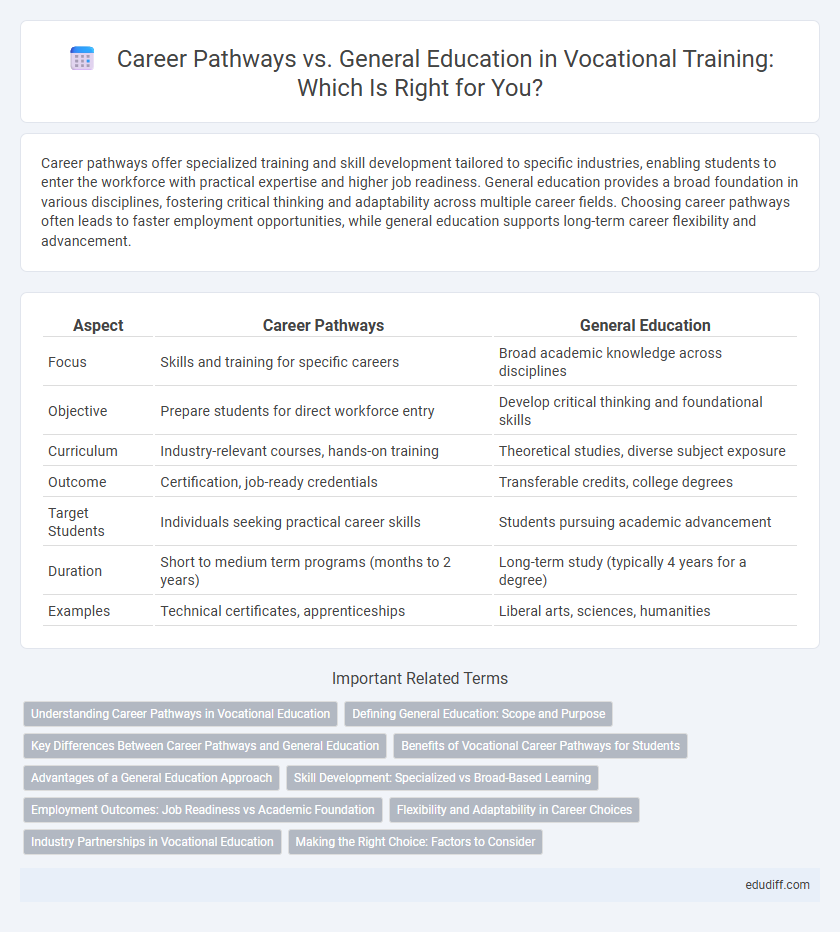Career pathways offer specialized training and skill development tailored to specific industries, enabling students to enter the workforce with practical expertise and higher job readiness. General education provides a broad foundation in various disciplines, fostering critical thinking and adaptability across multiple career fields. Choosing career pathways often leads to faster employment opportunities, while general education supports long-term career flexibility and advancement.
Table of Comparison
| Aspect | Career Pathways | General Education |
|---|---|---|
| Focus | Skills and training for specific careers | Broad academic knowledge across disciplines |
| Objective | Prepare students for direct workforce entry | Develop critical thinking and foundational skills |
| Curriculum | Industry-relevant courses, hands-on training | Theoretical studies, diverse subject exposure |
| Outcome | Certification, job-ready credentials | Transferable credits, college degrees |
| Target Students | Individuals seeking practical career skills | Students pursuing academic advancement |
| Duration | Short to medium term programs (months to 2 years) | Long-term study (typically 4 years for a degree) |
| Examples | Technical certificates, apprenticeships | Liberal arts, sciences, humanities |
Understanding Career Pathways in Vocational Education
Career pathways in vocational education provide targeted skill development aligned with specific industries, enabling students to gain practical expertise and improve job readiness. Unlike general education, which emphasizes broad academic knowledge, career pathways focus on hands-on training and certifications that directly match labor market demands. This approach enhances employability by connecting learners with in-demand careers through structured curricula and work-based learning opportunities.
Defining General Education: Scope and Purpose
General education encompasses foundational courses designed to develop critical thinking, communication skills, and broad knowledge across disciplines such as humanities, natural sciences, and social sciences. Its primary purpose is to equip students with essential cognitive abilities and cultural awareness, fostering adaptability in diverse career environments. Unlike vocational education, which targets specific job skills, general education provides a versatile intellectual framework supporting lifelong learning and interdisciplinary competence.
Key Differences Between Career Pathways and General Education
Career pathways focus on specialized skill development and industry-specific training to prepare students for immediate employment in targeted occupations. General education emphasizes broad knowledge across multiple disciplines, fostering critical thinking and adaptability for diverse career options. The key difference lies in career pathways' practical, hands-on learning tailored to job readiness versus general education's theoretical, wide-ranging academic foundation.
Benefits of Vocational Career Pathways for Students
Vocational career pathways provide students with specialized skills and practical experience directly aligned with industry demands, leading to higher employability rates and faster job placement compared to general education. These pathways often incorporate hands-on training, apprenticeships, and certifications that enhance workforce readiness and increase earning potential. Targeted vocational programs reduce educational costs and time to career entry, making them an efficient option for students seeking immediate employment and career advancement.
Advantages of a General Education Approach
General education programs foster critical thinking, communication, and analytical skills that are essential across diverse career pathways. This broad-based learning approach enhances adaptability, enabling students to navigate evolving job markets and multidisciplinary roles effectively. Employers value graduates with general education backgrounds for their problem-solving abilities and well-rounded knowledge foundation.
Skill Development: Specialized vs Broad-Based Learning
Career pathways emphasize specialized skill development tailored to specific industries like healthcare, technology, or skilled trades, enabling faster entry and advancement in targeted professions. General education offers broad-based learning that fosters critical thinking, communication, and adaptability, which support diverse career options across multiple fields. Employers often seek a balance of specialized expertise and foundational skills to maximize workforce versatility and innovation.
Employment Outcomes: Job Readiness vs Academic Foundation
Career pathways emphasize practical job readiness by providing hands-on training and industry-specific skills that directly align with employment demands. General education focuses on building a broad academic foundation, enhancing critical thinking and adaptability across various fields. Employment outcomes in career pathways show higher immediate job placement rates, while general education supports long-term career flexibility and advancement opportunities.
Flexibility and Adaptability in Career Choices
Career pathways offer specialized skills and targeted training that enhance flexibility by enabling individuals to quickly adapt to industry demands. General education provides a broad knowledge base, promoting adaptability across diverse fields but may lack immediate applicability. Combining vocational training with core academic skills maximizes career flexibility and resilience in changing job markets.
Industry Partnerships in Vocational Education
Industry partnerships in vocational education create tailored career pathways by integrating real-world skills and employer demands, enhancing student employability and job readiness. These collaborations offer hands-on training, apprenticeships, and internships that align directly with specific industries, surpassing the broader scope of general education. Strengthening ties with businesses ensures curriculum relevance and facilitates smoother transitions from education to workforce careers.
Making the Right Choice: Factors to Consider
Career pathways emphasize specialized skills and industry-specific training that align directly with job market demands, offering practical experience and faster entry into the workforce. General education provides a broad foundation of knowledge, critical thinking, and adaptability, which can support diverse career options and long-term personal growth. Key factors to consider when making the right choice include individual career goals, desired flexibility, job market trends, and the balance between skill acquisition and academic breadth.
Career Pathways vs General Education Infographic

 edudiff.com
edudiff.com